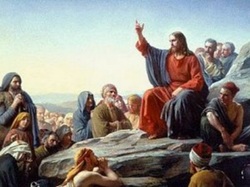
November 4th, 2012
31st Sunday in Ordinary Time
Shema’
Every Sunday, the Gospel reflects and fulfils the Old Testament Reading. Moses, for example, prefigures Christ, and the Exodus prefigures Christ’s baptism in water and blood. In today’s Mass, the Gospel actually repeats the Old Testament reading verbatim. It is the famous Shema’ Israel, in Hebrew “Listen O Israel.” The Shema’ is the Hebrew Credo: There is only One God.
In our First Reading, Moses had finally arrived within sight of the Promised Land, and he prepares to die. He parks the entire Hebrew Nation on Mount Nebo, overlooking the Dead Sea and the hilltop fortress which would become Jerusalem. He repeats for them the Ten Commandments, urging them to keep faith, so that they will have a “long life.” In one sense, he means a long and prosperous life in Israel, but in a deeper sense, he points to a long life, an eternal life, in the “Land flowing with milk and honey,” which is heaven. But to get to this Land, Moses exhorts the people with a final word, the Shema’: “Listen, O Israel! The Lord is Our God, the Lord alone! You shall love the Lord, Your God, with all your heart, and with all your soul, and with all your strength.” To this day, faithful Jews place a tiny scroll with these words on their foreheads when they pray, facing Jerusalem. They put little boxes (called Mezuzas) with this scroll on their doorposts, and touch them upon entering and departing their dwellings, as we do with holy water.
The First Commandment: God
1,400 years after that incident on Mt. Nebo, a scribe asks Jesus, the New Moses: “Which is the greatest of all the commandments?” By then, the Jews had not ten but 613 commandments, not counting many traditions and practices. The Catholic Church, by the way, has 1752 laws in our canonical code, and many more traditions and practices. Religion can get rather complicated!
The Scribe who approaches Jesus is no doubt a sincere man. He wants to know the one thing necessary for holiness. The interesting thing is that Jesus doesn’t give the Scribe only one commandment—he gives him two. Here’s the First (the Scribe knew it by heart anyway): Shema, O Israel, the Lord our God is Lord alone.”
If I were in a parish, I would preach my entire homily on this one line, and what it means for American Catholics on Tuesday. We elect the next president of the greatest nation on earth in two days, and on what basis will we elect him? On the basis of God’s Lordship? If Jesus is Lord, Christians in this country must vote for the man who will best respect His will. But I think most Christians will vote for the man who best respects the things of men, not of God, especially the American economy. If we vote for the economy, we will get a man who loves money, not God. And ultimately we will lose both our money and our God. Since this is not a parish, and I’m fairly sure you will all vote your faith, we move on. But be sure to vote on Tuesday, if you haven’t already (I mailed in my vote last week).
Shema, Israel! Jesus continues quoting Moses, to love the Lord with all our heart, soul, and strength. We must love God with the whole human person: with our heart (our feelings, emotions, and affections); with our soul (in spirit and prayer); with our strength (our will). But then Jesus adds mind as well (with our intellect). Love of God encompasses every dimension of our human person. His Lordship is absolute—over the food we eat, the movies we watch, our friendships, our sexual sphere, even over our money.
The Second Commandment: Neighbor
Finally, notice that Jesus gives the Scribe not only the First Law, but the Second Law as well, a law that Moses did not mention. It is to love your neighbor as yourself. We cannot love our neighbor without first loving God, for that is the First Commandment. But we cannot not love God if we do not love every other person, even people with whom we are at enmity. “Every person is Christ,” as Mother Teresa would say. Simple, but not easy.
The End
In the end, religion is not that complex. The Church gives us many laws to help us navigate our way to heaven. But in the end, “we go to God with empty hands,” in the words of St. Therese. In the end, God will ask us, as he asked Peter, “do you love me?” If you love me, you will feed my sheep.
November is the month of the end, the end of the liturgical year. It is the month when we consider our own end, and those who have already ended their earthly pilgrimage—the saints in heaven, the holy souls in purgatory. We begin this last month with Christ’s words ringing in our hearts, preparing us for heaven: Shema’, O Israel! The Lord is Our God, the Lord Alone! Love Him, with everything you have, and your neighbor as yourself, that you may have a long life in the Land the Lord your God shall give to you.


 RSS Feed
RSS Feed